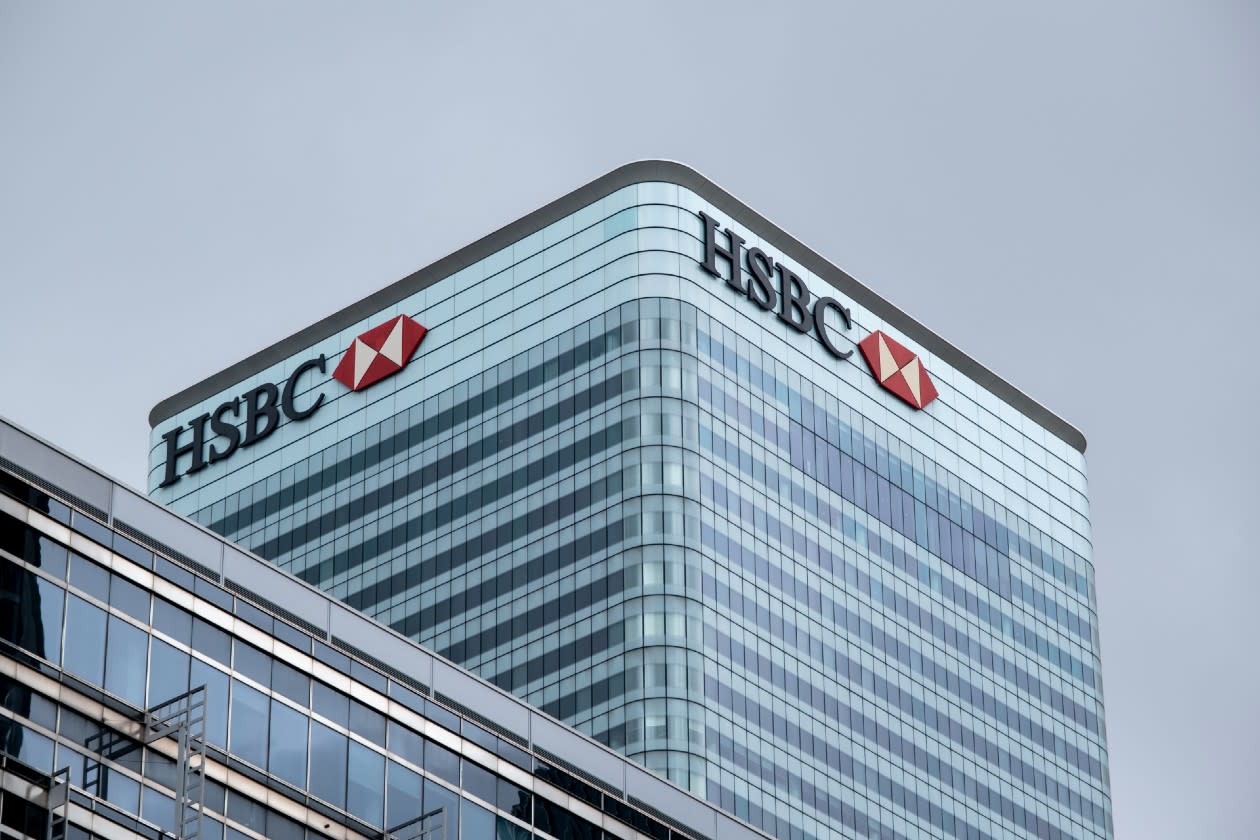HSBC reported a 5% rise in underlying first-quarter revenue to $17.7bn (which ignores currency and one-off items). Growth was driven by fee income, with a small dip in banking net interest income.
Underlying profit before tax was flat at $9.2bn, 10% better than expected. Not included in that figure was a $2.1bn accounting charge associated with its stake in a Chinese bank. Credit impairments rose $0.7bn to $1.1bn.
The CET1 ratio, a key measure of financial resilience, was 14.6% (14.0-14.5% target range). A new buyback of up to $3bn was announced, alongside a quarterly dividend of $0.10 per share.
Full-year guidance was unchanged, including a target of around $42bn in banking net interest income over 2025. But management called out tariffs as a potential cause for profits weakness in future years.
The shares fell 4.3% in early trading.
Our view
HSBC’s headline second-quarter results were skewed yet again by one-off items, including a $2.1bn hit from dilution and impairment in its Chinese bank holding. But underlying performance was good, with pre-tax profit beating expectations thanks to solid growth in wealth management.
The slight niggle came from guidance comments that suggested medium-term expectations may not be hit, given the impact of tariffs on global economic conditions. There was a distinct lack of detail, though, leaving investors and analysts to draw their own conclusions, rarely a positive thing.
Efforts to refocus the business on higher growth areas continue. HSBC has already made several changes, including selling its retail banking operations in France and completely exiting Canada and Argentina. Latest plans involve reducing costs by around $3bn in the coming years, with around half passing through to the profit line and half reinvested.
Traditional banking is the key driver of income, but finding growth has been a bugbear. As the interest rate environment softens, interest income is under pressure and needs to be supported by loan growth. But that’s unlikely to happen this year, with tariff uncertainty impacting borrowers' confidence.
Fee income is also key, from areas like trading and wealth management. Interest rates and consumer confidence still impact some income streams, but not to the extent of more traditional banking operations. The diversification is welcome, but there are still question marks over the strong growth seen in wealth management and whether it can be sustained.
The Asian focus is a positive when it comes to areas like wealth management, with this being a high-growth part of the market. HSBC has leadership positions, so looks well placed to benefit. That said, a key issue has been pressure from investors to split the Asian elements from the rest of the group. Good performance of late is helping keep those pressures at bay, for now.
The balance sheet is strong and supports ongoing capital distributions, though nothing is guaranteed. We are keeping an eye on non-performing loans; HSBC has historically been seen as a leader among its Asian peers, but a tick higher in recent years has eroded that position. We aren’t concerned, but it’s something to monitor.
The global focus is a differentiator from many of its peers, and HSBC is our preferred UK-listed name for Asian exposure. That said, we think UK focused banks have a much clearer path to growth over the medium term.
Environmental, Social and Governance (ESG) risk
The financials sector is medium-risk in terms of ESG. Product governance is the largest risk for most companies, especially those in the US and Europe with enhanced regulatory scrutiny. Data privacy and security is also an increasingly important risk for banks and diversified financial firms. Business ethics, ESG integration and labour relations are also worth monitoring.
According to Sustainalytics, HSBC’s management of material ESG issues is strong.
HSBC faces risks from business ethics and product governance due to its involvement in related lawsuits and investigations. Its policies against money laundering, bribery, and corruption also have gaps. Although HSBC's credit and loan standards generally meet industry norms, its approach to client engagement on climate issues, particularly in Asia, lacks sufficient evidence.
HSBC key facts
All ratios are sourced from LSEG Datastream, based on previous day’s closing values. Please remember yields are variable and not a reliable indicator of future income. Keep in mind key figures shouldn’t be looked at on their own – it’s important to understand the big picture.
This article is not advice or a recommendation to buy, sell or hold any investment.No view is given on the present or future value or price of any investment, and investors should form their own view on any proposed investment.This article has not been prepared in accordance with legal requirements designed to promote the independence of investment research and is considered a marketing communication.Non - independent research is not subject to FCA rules prohibiting dealing ahead of research, however HL has put controls in place(including dealing restrictions, physical and information barriers) to manage potential conflicts of interest presented by such dealing.Please see our full non - independent research disclosure for more information.


